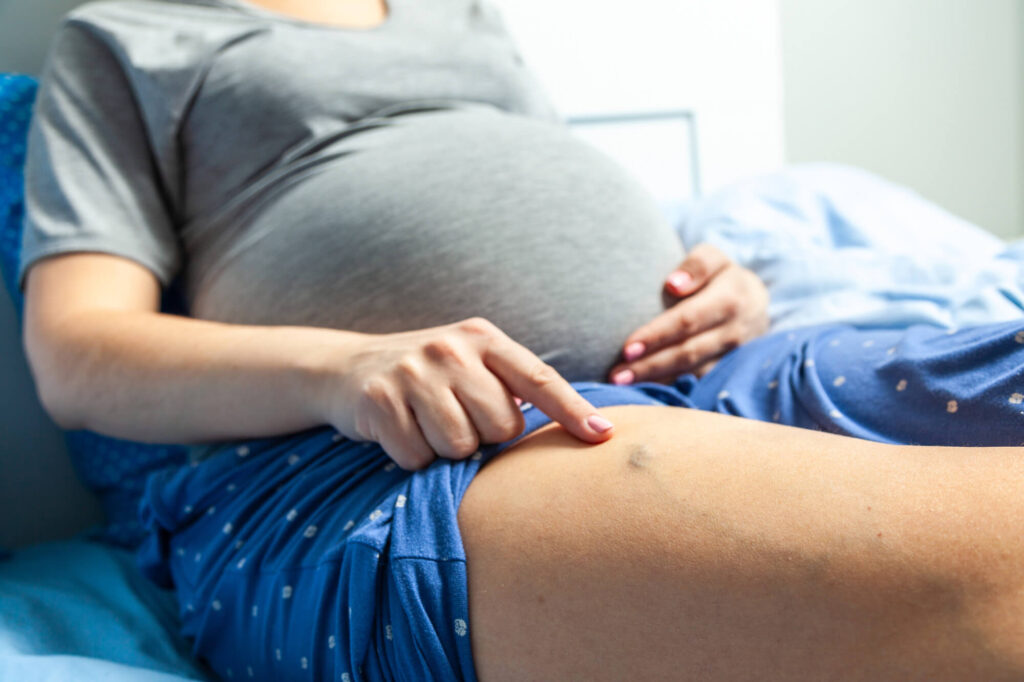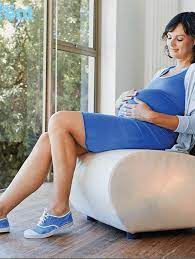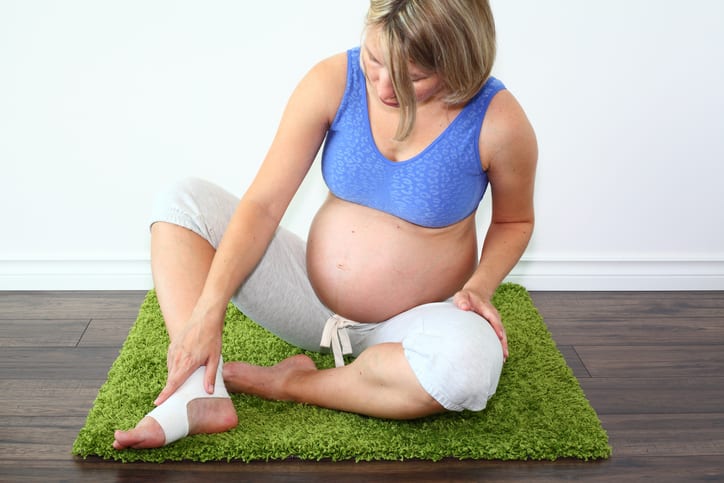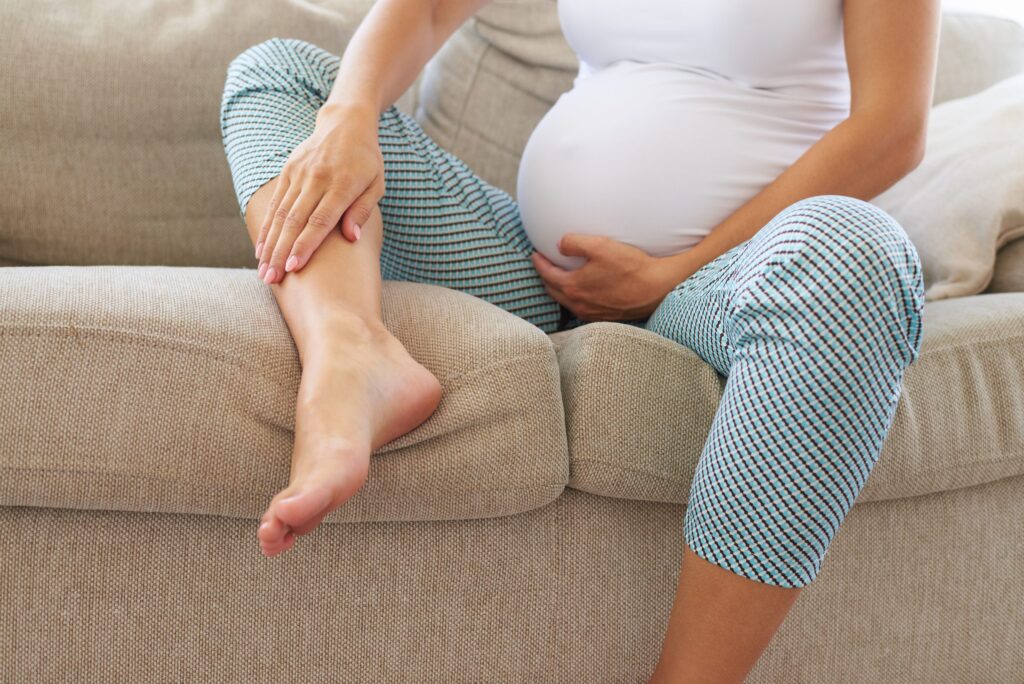Symptoms of Varicose Veins During Pregnancy
Pregnancy is an incredible time filled with anticipation and joy, but it can also bring along some unexpected physical changes, one of which is varicose veins. Varicose veins during pregnancy are not uncommon, and they occur due to a combination of hormonal, circulatory, and physical changes that happen in the body. In this article, we’ll delve into the symptoms of varicose veins during pregnancy, their causes, and some effective strategies for managing them.

Introduction to Varicose Veins in Pregnancy
Varicose veins are enlarged, twisted veins that usually occur in the legs but can also appear in other areas like the vulva during pregnancy. They can become quite noticeable, especially during the second and third trimesters, when increased blood volume and the growing uterus put pressure on the veins. While they may be a cosmetic concern for many, they can also cause physical discomfort.
Causes of Varicose Veins During Pregnancy
Varicose veins develop when the veins lose their ability to effectively transport blood back to the heart, resulting in pooling. During pregnancy, there are specific causes that make this condition more common:
- Hormonal Changes: Progesterone, a hormone that increases during pregnancy, plays a major role in relaxing the blood vessels, leading to an increased risk of varicose veins.
- Increased Blood Volume: To support the growing baby, a pregnant woman’s blood volume increases, putting extra strain on the circulatory system.
- Pressure from the Uterus: As the uterus grows, it exerts pressure on the veins, especially those in the pelvic area, leading to reduced blood flow from the legs back up to the heart.
The Role of Hormones in Varicose Vein Development
Progesterone and Its Effect on Veins
Progesterone is one of the primary hormones responsible for the relaxation of smooth muscles, including the walls of veins. During pregnancy, the increased levels of progesterone cause veins to become more relaxed, which makes it more difficult for them to transport blood efficiently.
Increased Blood Volume During Pregnancy
The circulatory system experiences extra stress during pregnancy due to increased blood volume. This additional blood flow helps nourish the growing fetus but also puts pressure on the veins, especially in the lower part of the body.
Common Symptoms of Varicose Veins in Pregnancy
Pregnancy-related varicose veins can vary in severity, ranging from mild discomfort to significant pain and swelling. Here are some of the most common symptoms:
Swollen and Twisted Veins Visible on the Surface
The most noticeable symptom is the appearance of bulging, twisted, and discolored veins, usually on the legs. They may look bluish or purple and are more pronounced due to increased pressure and volume in the veins.
Heavy or Aching Legs
A common complaint among pregnant women is a sensation of heaviness or aching in the legs, especially towards the end of the day. This discomfort is often aggravated by prolonged standing or sitting.
Itching and Skin Irritation
Itching around the affected veins is another symptom that can be particularly bothersome. This can happen because the skin around varicose veins becomes dry or irritated.
Cramping, Particularly at Night
Pregnant women often report experiencing leg cramps at night, which may be linked to poor blood circulation caused by varicose veins. This symptom can interrupt sleep and lead to restless nights.

Location of Varicose Veins: Where They Commonly Occur
Legs: The Most Affected Area
The legs are the most common location for varicose veins because they are farthest from the heart, meaning the veins there have to work the hardest against gravity to pump blood upwards.
Vulvar Varicose Veins: What to Expect
In some cases, pregnant women can also develop varicose veins in the vulvar area. While not as common, vulvar varicose veins can cause significant discomfort, especially towards the end of pregnancy.
Risk Factors Contributing to Varicose Veins During Pregnancy
Several factors can increase a woman’s risk of developing varicose veins during pregnancy:
Genetic Predisposition
If a family member, particularly your mother, has had varicose veins, there is a higher likelihood you may experience them as well during pregnancy.
Weight Gain and Its Effect on Veins
Weight gain during pregnancy is normal and healthy, but added body weight can increase pressure on the veins in the legs and pelvis, contributing to varicose vein formation.

Prolonged Standing or Sitting
Staying in one position for long periods, whether standing or sitting, can make it difficult for blood to return to the heart, worsening the symptoms of varicose veins.
Impact of Varicose Veins on Daily Life During Pregnancy
Varicose veins may not pose a serious medical risk, but they can significantly impact daily life:
Discomfort in Mobility and Exercise
Swollen, painful veins can make it challenging to walk or exercise, which is essential for overall pregnancy health. Some women may find it uncomfortable to stay on their feet for extended periods.
Sleep Disruptions Due to Leg Cramping
Leg cramps and discomfort often disrupt sleep, making it harder for pregnant women to get the rest they need.
Prevention and Management of Varicose Veins Symptoms
Exercise and Keeping Active
Regular, moderate exercise such as walking, swimming, or prenatal yoga can improve circulation and help manage varicose vein symptoms.
Elevating Legs and Using Compression Stockings
Raising your legs when resting can improve blood flow and reduce swelling. Wearing compression stockings can also help by supporting the veins and preventing blood from pooling.
Home Remedies for Alleviating Varicose Vein Symptoms
Cold Compress and Its Benefits
Applying a cold compress can reduce swelling and provide relief from pain or discomfort associated with varicose veins.
Using Essential Oils for Relief
Essential oils such as lavender or cypress can be gently massaged into the affected area to improve circulation and reduce discomfort.
When to See a Doctor About Varicose Veins During Pregnancy
While varicose veins are usually harmless, there are times when medical advice is necessary:
Signs of Complications to Look Out For
Seek medical attention if the veins become very painful, warm to the touch, or if there is significant swelling, as these could be signs of a more serious condition like a blood clot.
Medical Treatments That Are Safe During Pregnancy
Your doctor may recommend wearing compression stockings or other non-invasive measures during pregnancy, as surgical options are typically avoided until after childbirth.
Long-term Outlook: What Happens After Pregnancy?
Do Varicose Veins Disappear After Birth?
For many women, varicose veins improve significantly after giving birth. However, some may find that the veins do not fully disappear.
Permanent Treatment Options Post-Pregnancy
Treatments such as sclerotherapy or laser therapy are often considered after pregnancy for women who want a more permanent solution.
FAQs About Varicose Veins in Pregnancy
Can Varicose Veins Affect the Baby?
Generally, varicose veins do not impact the baby’s health. They are more of a comfort issue for the mother.
Are Varicose Veins Dangerous During Pregnancy?
In most cases, varicose veins are not dangerous. However, if they are causing severe symptoms or signs of a clot, medical advice is essential.
Is It Possible to Prevent Varicose Veins Entirely?
While it may not be possible to prevent varicose veins entirely, maintaining a healthy weight, staying active, and avoiding prolonged standing can help reduce the risk.
Can Varicose Veins Be a Sign of Another Health Condition?
Varicose veins are usually a result of pregnancy-related changes, but if they appear suddenly or worsen quickly, it is worth discussing with a healthcare provider to rule out any underlying conditions.

Conclusion
Varicose veins during pregnancy can be uncomfortable and, at times, unsightly, but they are usually harmless. Understanding the symptoms, their causes, and effective management techniques can help reduce discomfort and improve overall quality of life during this special time. If you are experiencing severe symptoms, always consult your healthcare provider to ensure both your health and your baby’s health are not compromised.
A perfect Solution Of Varicose Veins Click Here



